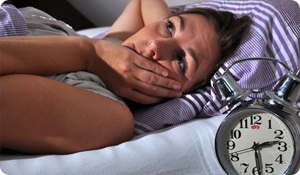
"To sleep, perchance to dream." Shakespeare's famed words sound so tranquil, but if you've ever read Hamlet, you know the story's about to take a bad turn. For many Americans, sleep is also a maddening prospect representing hours of tossing and turning with little to show for it other than the eventual fatigue, irritability, and exhaustion.
According to the National Sleep Foundation, the average American gets only 6.8 hours of sleep on weekdays, a far cry from the eight hours of nighttime rest doctors generally recommend. What's more, according to the National Center for Sleep Disorders Research at the National Institutes of Health, 30 to 40 percent of adults have symptoms of insomnia within a given year—and about 10 to 15 percent have chronic insomnia.
Understanding Insomnia
The word "insomnia" comes from the Latin "in" ("no") and "somnus" ("sleep"), so it literally means "no sleep," or the inability to sleep. The condition is characterized by one or more of the following experiences:
- Difficulty going to sleep
- Difficulty staying asleep
- Waking up too early in the morning
- Not feeling rested after sleeping
For sufferers, insomnia can cause the following difficulties during the day: fatigue, excessive sleepiness, trouble thinking clearly, inability to stay focused, anger, anxiety, irritability, chronic illness, or feelings of depression.
According to the U.S. Department of Health and Human Services, insomnia can be:
- Transient (short term), lasting from a single night to a few weeks
- Intermittent (on and off), happening from time to time
- Chronic (ongoing), occurring at least three nights a week for a month or longer
Chronic insomnia may be categorized as either primary or secondary. Primary insomnia is not related to any other health problem. But secondary insomnia can be caused by a medical condition (such as cancer, asthma, or arthritis), drugs, stress or a mental health problem (such as depression), or a poor sleep environment (such as too much light or noise, or a bed partner who snores).
Getting Treatment
If you're experiencing symptoms of insomnia, it's important that you schedule an appointment to talk to your doctor. He or she can suggest prescription or non-prescription sleep aids and/or advise you on lifestyle changes to help your manage the condition.
Although the causes of insomnia vary from person to person, the following habits can help minimize the effects of most types of sleeplessness:
- Establish a regular sleep routine, and don't vary the routine, even on weekends
- Don't spend too much time in bed, and avoid watching TV or working in the bedroom
- Avoid alcohol, caffeine, and nicotine late in the day
- Finish exercising at least three hours before retiring for the night
- Create a sleep-friendly environment that is cool, quiet, and dark





